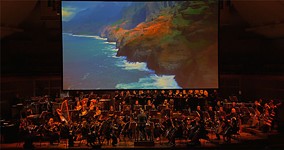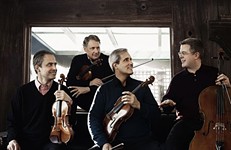Equus: Probing the Darkness
Local Arts Reviews
Reviewed by Robi Polgar, Fri., Oct. 8, 1999

Equus: Probing the Darkness Mary Moody Northen Theatre,
through October 10
Running time: 2 hrs, 50 min
Not to suggest that director Michael Costello's staging of Peter Shaffer's exceptionally well-made play is anything short of impressive, but his philosophical rationalization behind this production undervalues the play's deeper message as well as the extraordinary work of his cast, crew, and designers. "Televisions have become our priests," he writes in his director's notes, "the malls our cathedrals, and our spirit is imprisoned in a black pit; and we wonder why our children commit horrific acts of violence." While this sentiment is in many ways true for an America that seeks crisis resolution with high-powered weaponry, the horrific act of violence that is the foundation for this rather English play has nothing to do with television or malls or even the imprisonment of the spirit. It is not some modern, suburban atrocity played out by children upon children. Rather, it is the culmination of primal cultural forces at vicious odds: sexual oppression, peer pressure, parental hypocrisy, and the struggle of the individual to define his world. When young Alan Strang blinds six horses in what everyone believes to be a feral rage, he is acting on motives of the utmost spirituality, a madness brought on by a hopeless and inflammatory contradiction between belief in his personal god and his equally powerful and incomprehensible teenage sexuality.
This play is perfect fare for a gutsy university theatre program and a perfect vehicle for augmenting an ensemble of talented young actors with a seasoned professional from whom the next generation of theatre stars can learn David Birney portrays Dysart, a psychiatrist struggling with issues that go beyond his treatment of psychotic children. Dysart's struggle has begun long before he encounters young Alan, but it is Alan that is the catalyst for Dysart's emotional ignition. Yet Birney clings so hard to the emotional content of his role that the self-deprecatory humor and the wonder (and terror) of his discoveries Designer Michael Massey takes an interpretive slant to the set, evoking the classical world so often referred to by Dysart even while maintaining the text-prescribed theatre-in-the-round. The horses are effectively rendered by costume designer Eric Reyez-Abbott and brought eerily to life by six actors in black jeans and T-shirts, work boots on metal mini-stilts, and bronze-wire horse's head masks. Max Thomas, as the horse Nugget, is particularly praiseworthy, achingly tall on his toes at the play's climax.
This work is one of the seminal plays of the 20th century, one that revels in the immeasurable creativity and individuality of the human consciousness even as it probes the darker parts of humanity's self-inflicted misery. So much more than some Columbine-like shoot-'em-up, Shaffer's scathing, perceptive play asks a universal, essential question about the relationship between man and god.










